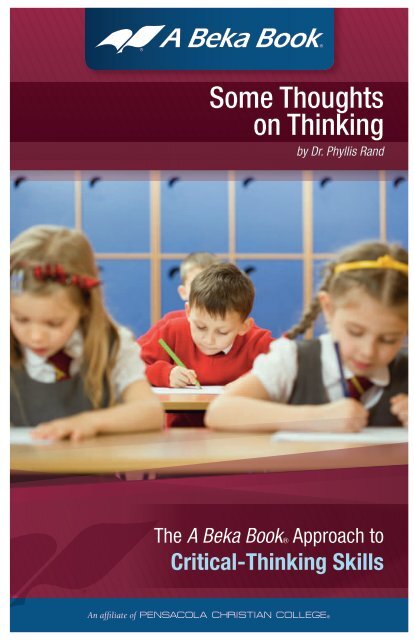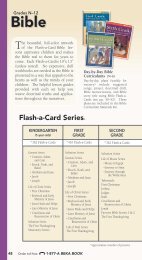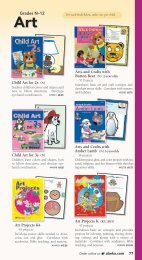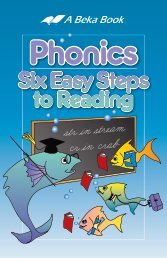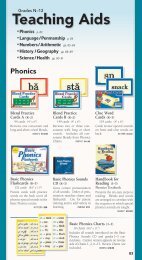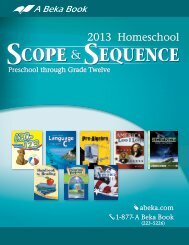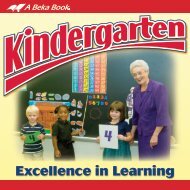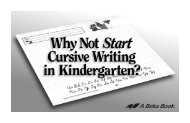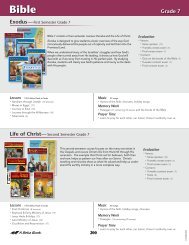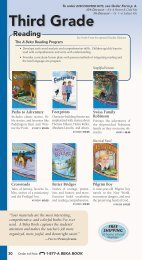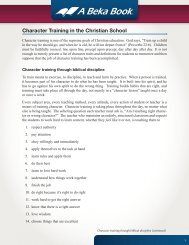ABB Some Thoughts on Thinking (PDF) - A Beka Book
ABB Some Thoughts on Thinking (PDF) - A Beka Book
ABB Some Thoughts on Thinking (PDF) - A Beka Book
You also want an ePaper? Increase the reach of your titles
YUMPU automatically turns print PDFs into web optimized ePapers that Google loves.
<str<strong>on</strong>g>Some</str<strong>on</strong>g> <str<strong>on</strong>g>Thoughts</str<strong>on</strong>g><br />
<strong>on</strong> <strong>Thinking</strong><br />
by Dr. Phyllis Rand<br />
The A <strong>Beka</strong> <strong>Book</strong>R Approach to<br />
Critical-<strong>Thinking</strong> Skills<br />
R<br />
An affiliate of PENSACOLA CHRISTIAN COLLEGE
<str<strong>on</strong>g>Some</str<strong>on</strong>g> <str<strong>on</strong>g>Thoughts</str<strong>on</strong>g> <strong>on</strong> <strong>Thinking</strong><br />
by Dr. Phyllis Rand<br />
<str<strong>on</strong>g>Some</str<strong>on</strong>g> observers of problems in<br />
American educati<strong>on</strong> have diagnosed<br />
educati<strong>on</strong>’s essential illness as the<br />
failure to teach students to think.<br />
There is, indeed, plenty of observable<br />
evidence that attests to weak<br />
scholarship, illogical c<strong>on</strong>clusi<strong>on</strong>s,<br />
bad decisi<strong>on</strong>s, rejecti<strong>on</strong> of traditi<strong>on</strong>al<br />
values, and lack of innovati<strong>on</strong>—<br />
just overall mindlessness.<br />
The recommended ways for educati<strong>on</strong><br />
to cure this problem are many<br />
and varied. For example, Romantics<br />
and progressives have always believed<br />
that natural, hands<strong>on</strong><br />
learning and collaborative<br />
problem solving<br />
create the freest and best<br />
thinkers. More recently,<br />
Howard Gardner asserts that there<br />
has been too much attenti<strong>on</strong> given<br />
to thinking as scholastic and linguistic<br />
intelligence; instead, classroom<br />
less<strong>on</strong>s should accommodate other<br />
forms of intelligence such as spatial<br />
and musical thinking. 1 Postmodernists<br />
argue that we must legitimize all<br />
thought or be accused of destroying<br />
self-esteem and teaching what to<br />
think. Classicists stress the c<strong>on</strong>tributi<strong>on</strong><br />
of studying logic and, from<br />
a young age, an inflected language<br />
such as Latin. Machen makes a<br />
point of the importance of first learning<br />
informati<strong>on</strong>; “we cannot think in<br />
a vacuum,” he says. 2 Psychologists<br />
c<strong>on</strong>tinue to recommend new cogni-<br />
American educati<strong>on</strong>’s<br />
essential illness—<br />
failure to teach<br />
students to think.<br />
tive learning theories and ways to<br />
improve learning outcomes.<br />
In general, as Knight observes,<br />
more emphasis is put <strong>on</strong> new techniques<br />
and innovati<strong>on</strong>s (the how)<br />
than <strong>on</strong> evaluati<strong>on</strong> and actual needs<br />
(the why). 3 The tried and true must<br />
be reformed and the reforms tried<br />
out <strong>on</strong> the students.<br />
As publishers of educati<strong>on</strong>al materials,<br />
we at A <strong>Beka</strong> <strong>Book</strong> ask ourselves<br />
if it should be a goal of Christian<br />
educati<strong>on</strong> to teach children to be<br />
thinkers. The answer is assuredly<br />
yes. Much in life depends<br />
<strong>on</strong> the quality of<br />
our thoughts. The next<br />
questi<strong>on</strong>s are how do we<br />
define thinking and how<br />
do we set out to help students be<br />
good thinkers?<br />
Our first step is always to go back<br />
to our stated purpose: The Godgiven<br />
ministry of Christian schools<br />
is to lead young people to Christ<br />
and train them in the Bible, Christian<br />
character, language, and traditi<strong>on</strong>al<br />
subject matter. Today’s<br />
students need to be taught the accumulated<br />
wisdom of the past from<br />
God’s point of view and trained in<br />
the way they should go (Prov. 22:6)<br />
so they will have a firm foundati<strong>on</strong><br />
from which to evaluate the present<br />
and make proper decisi<strong>on</strong>s for the<br />
future. Staying true to that purpose
a Christian perspective...<br />
makes it easy to reject some of the<br />
cures suggested above. Our research<br />
must begin with the most original<br />
source and <strong>on</strong>ly true foundati<strong>on</strong> of<br />
true scholarship in any form of human<br />
endeavor—God’s Word.<br />
The most often used label for the<br />
kind of thinking lacking in young<br />
people is critical thinking. The<br />
objective of critical thinking, like<br />
all other academic objectives, cannot<br />
be separated from our biblical<br />
metaphysics (what is true about the<br />
world, about God, about man?),<br />
epistemology (can we know truth, is<br />
it relative or absolute, is it independent<br />
of experience?) and axiology<br />
(what is good and beautiful and the<br />
best way to live?).<br />
Only the Bible truly accounts for the<br />
ability of man to think and verbalize<br />
thought. The Bible even addresses<br />
critical thinking. For example, the<br />
Proverbs are far more than a collecti<strong>on</strong><br />
of human wisdom gained by<br />
experience. They embody the philosophy<br />
of heaven for the benefit of<br />
people <strong>on</strong> earth. In the first chapter,<br />
Solom<strong>on</strong> lists his objectives:<br />
• to know wisdom and instructi<strong>on</strong><br />
• to perceive the words of understanding<br />
• to receive instructi<strong>on</strong> of wisdom,<br />
justice, judgment, and<br />
equity<br />
• to give subtilty to the simple<br />
• to give the young man knowledge<br />
and discreti<strong>on</strong><br />
• to understand and interpret a<br />
proverb<br />
Sounds like a good critical thinking<br />
manual, doesn’t it!<br />
God’s view is to teach students<br />
godly thinking. It can be said that<br />
the basis of critical thinking is the<br />
ability to come to well-reas<strong>on</strong>ed<br />
judgments supported by biblical<br />
principles. Only then can we examine,<br />
analyze, synthesize, evaluate—in<br />
short, make wise decisi<strong>on</strong>s.<br />
Critical thinking does not mean subjectively<br />
c<strong>on</strong>structing “new truth”<br />
relative to times and situati<strong>on</strong>s.<br />
It is helpful to realize that traditi<strong>on</strong>al,<br />
Christian educati<strong>on</strong> develops understanding<br />
and thinking; it imparts<br />
the necessary foundati<strong>on</strong> of knowledge<br />
as well as skills and attributes<br />
needed for critical thinking.<br />
Sternberg’s model for what he calls<br />
“developing expertise” is helpful.<br />
He names five elements in this development<br />
process, all of which<br />
have curriculum implicati<strong>on</strong>s for<br />
teaching how to think:<br />
Metacognitive skills—the<br />
skills that refer to a student’s understanding<br />
of how to think about and<br />
accomplish academic tasks. What is<br />
the writing process? What are the<br />
steps to solving a word problem?<br />
What questi<strong>on</strong>s do I ask first?<br />
Learning skills—the skills<br />
that teachers dem<strong>on</strong>strate when they<br />
explain new learning in light of what<br />
has already been learned, when they<br />
explain what is relevant and what is<br />
not, or when they teach good study<br />
habits and note taking. Learning<br />
3
skills can be taught explicitly and<br />
even picked up implicitly from good<br />
teaching.<br />
<strong>Thinking</strong> skills—the skills<br />
which Sternberg divides into critical<br />
(analytical) thinking, creative (imaginative)<br />
thinking, and practical (applying,<br />
using, practicing) thinking.<br />
Knowledge—knowledge of<br />
facts, c<strong>on</strong>cepts, principles, laws, and<br />
procedures.<br />
Motivati<strong>on</strong>—what keeps students<br />
wanting to learn. 4<br />
Sternberg’s descripti<strong>on</strong> of critical<br />
thinking as <strong>on</strong>ly <strong>on</strong>e of the comp<strong>on</strong>ents<br />
in the measurement of effective<br />
educati<strong>on</strong> mirrors the goal of a<br />
general but broad traditi<strong>on</strong>al educati<strong>on</strong>.<br />
Emphasizing <strong>on</strong>e skill to the<br />
neglect of another in the overall<br />
curriculum does not take advantage<br />
of the way that learning skills and<br />
thinking skills, etc., all influence<br />
<strong>on</strong>e another directly and indirectly.<br />
That neglect is often seen in wellmeaning<br />
reforms made in reacti<strong>on</strong><br />
to perceived weak areas when it is<br />
really the whole curriculum which<br />
has been weakened.<br />
By recognizing the importance of<br />
the classroom teacher in developing<br />
a student’s “expertise,” particularly<br />
his thinking and learning skills, how<br />
does A <strong>Beka</strong> <strong>Book</strong> help?<br />
1. By providing quality curriculum<br />
and materials that emphasize basic<br />
but wide knowledge of subject<br />
c<strong>on</strong>tent as noted above. It is true<br />
that we need something in our heads<br />
to think with, as well as to inspire<br />
and to provide a foundati<strong>on</strong> of new<br />
knowledge and new ideas. (See more<br />
in afterword, p. 6).<br />
2. By emphasizing the intellectual<br />
skills <strong>on</strong>ce called the liberal<br />
arts—the skills of reading, writing,<br />
speaking, listening, and the<br />
mathematical and scientific skills<br />
of observing, measuring, calculating,<br />
estimating. These skills train<br />
the mind. The current lack of skills<br />
instructi<strong>on</strong> in favor of a more holistic<br />
approach has negatively affected<br />
intellectual development and good<br />
thinking.<br />
3. By writing materials from a<br />
Christian perspective in order to<br />
teach ideas and values and learn<br />
wisdom, which begins with the fear<br />
of the Lord. For years, America enjoyed<br />
the blessing of citizens whose<br />
comm<strong>on</strong> sense was biblical. Today,<br />
however, we have used up that<br />
capital, and that kind of sense is not<br />
so comm<strong>on</strong>. No less<strong>on</strong>s in how to<br />
think will bring it back. Secular educati<strong>on</strong><br />
teaches children to think humanistically—to<br />
c<strong>on</strong>struct thoughts<br />
and opini<strong>on</strong>s and answers irrespective<br />
of God’s. Teachers often hear<br />
that we must teach children to think,<br />
not what to think. But just learning<br />
to think, without Bible principles<br />
at the center of our thoughts, is not<br />
enough. In fact, it opens up the mind<br />
to all kinds of delusi<strong>on</strong>.<br />
4. By providing a Bible curriculum<br />
for daily Bible teaching. Bible<br />
4
...of critical thinking<br />
class gives students the foundati<strong>on</strong><br />
of all wisdom. By means of teacherdirected<br />
Bible less<strong>on</strong>s rather than<br />
workbook-directed less<strong>on</strong>s, we<br />
ensure that learning takes place in<br />
the affective as well as the cognitive<br />
domain. The Bible gives us the<br />
universal truths which are necessary<br />
for all thinking. <strong>Thinking</strong> that does<br />
not begin with the fear of the Lord is<br />
foolishness.<br />
5. By providing c<strong>on</strong>tent and methods<br />
with a traditi<strong>on</strong>al emphasis <strong>on</strong><br />
character development. The traditi<strong>on</strong>al,<br />
teacher-directed approach<br />
has the w<strong>on</strong>derful side benefit of<br />
helping form godly character in<br />
students. Critical thinking requires<br />
such intellectual traits or virtues as<br />
focus or discipline, attenti<strong>on</strong>, perseverance,<br />
integrity, accuracy, fairmindedness,<br />
courage. Every subject<br />
area, every teaching method, every<br />
attitude, every acti<strong>on</strong> of student or<br />
teacher is a means of training in<br />
these vital intellectual traits. The<br />
teacher who maintains an orderly,<br />
structured classroom and expects<br />
the students to work hard to learn,<br />
whether they feel like it or not, is<br />
teaching them to<br />
1. respect authority,<br />
2. pay attenti<strong>on</strong>,<br />
3. obey willingly and immediately,<br />
4. apply themselves to the task at<br />
hand,<br />
5. learn rules and apply them,<br />
6. do their best,<br />
7. learn to love hard work,<br />
8. understand how things work<br />
together,<br />
9. finish the job,<br />
10. do right because it's right to do<br />
right,<br />
11. work hard to get the right answer,<br />
12. know that there is a right answer,<br />
13. love wisdom,<br />
14. choose things that are excellent,<br />
and<br />
15. develop habits of orderliness,<br />
carefulness, alertness, obedience,<br />
persistence, h<strong>on</strong>esty, accomplishment,<br />
cooperati<strong>on</strong>, faithfulness,<br />
accuracy, industry, perseverance,<br />
self-c<strong>on</strong>trol, attentiveness, fairness,<br />
thoroughness, c<strong>on</strong>fidence,<br />
resp<strong>on</strong>sibility, decisiveness, effort,<br />
steadfastness, discipline,<br />
endurance, helpfulness, reas<strong>on</strong>ableness,<br />
neatness, patience,<br />
judgment, loyalty, and respect. 5<br />
6. By providing professi<strong>on</strong>al development<br />
opportunities that promote<br />
quality teaching throughout the<br />
school day. The A <strong>Beka</strong> <strong>Book</strong> inservice<br />
seminars, clinics, and Professi<strong>on</strong>al<br />
Development Online are<br />
available throughout the year and<br />
have helped to train thousands of<br />
teachers.<br />
In summary, we want our customers<br />
to know that the development<br />
of good thinking is an important<br />
comp<strong>on</strong>ent of the A <strong>Beka</strong> <strong>Book</strong> curriculums<br />
and textbooks. From the<br />
earliest grades, the materials logically<br />
work together to produce<br />
thought and knowledge. As students<br />
pro gress through the grades, expectati<strong>on</strong>s<br />
and opportunities increase as<br />
subject c<strong>on</strong>tent and work becomes<br />
more complex.<br />
5
Afterword<br />
American children who score poorly<br />
<strong>on</strong> tests of knowledge probably have<br />
not been trained in the other skills.<br />
Take, for example, the many ways<br />
that thinking is developed hand in<br />
hand with knowledge. Look at these<br />
examples from A <strong>Beka</strong> curriculum:<br />
Intensive ph<strong>on</strong>ics training, in<br />
c<strong>on</strong>trast to the rote-memorizati<strong>on</strong>,<br />
sight-word method of beginning<br />
reading, trains students in analytical<br />
thinking. Rather than being told that<br />
c-a-t spells cat, they are taught why<br />
c-a-t spells cat. They are given the<br />
rules and taught how to apply them<br />
to figure out words for themselves.<br />
Reading less<strong>on</strong>s in the A <strong>Beka</strong><br />
<strong>Book</strong> program are able to place emphasis<br />
<strong>on</strong> reading for meaning because<br />
reading builds <strong>on</strong> the decoding<br />
skill of ph<strong>on</strong>ics. Students are<br />
expected to read every day, and they<br />
are held accountable for what they<br />
read by means of teacher questi<strong>on</strong>s<br />
and quizzes that require students to<br />
recall facts, see relati<strong>on</strong>ships, draw<br />
inferences, and make evaluati<strong>on</strong>s.<br />
Workbooks are seldom used, because<br />
they take too much time away<br />
from reading and tend to bore students<br />
with busy work.<br />
Grammar requires students<br />
to figure out how the parts of a sentence<br />
go together to form a whole,<br />
how the parts are related to each<br />
other, and how the main ideas can<br />
be distinguished from supporting<br />
details. This analysis effectually<br />
teaches students to think.<br />
Vocabulary training further<br />
sharpens students’ thinking skills<br />
as they deal with the precise meanings<br />
of words and the history of their<br />
formati<strong>on</strong>. The more words students<br />
know and use, the better equipped<br />
they are to think.<br />
Literature helps students to<br />
fill their minds with thoughts from<br />
some of the world’s greatest writers<br />
so that they may think great<br />
thoughts and learn to express them<br />
to others. It gets them in tune with<br />
the best. The questi<strong>on</strong>s at the end of<br />
the selecti<strong>on</strong>s in the A <strong>Beka</strong> <strong>Book</strong> literature<br />
anthologies involve students<br />
in all levels of thinking.<br />
Compositi<strong>on</strong> is thinking.<br />
When students are regularly required<br />
to work <strong>on</strong> a thesis sentence<br />
until its subject and predicate express<br />
exactly what the compositi<strong>on</strong><br />
will attempt to prove, the students<br />
are getting some of the finest practice<br />
<strong>on</strong> thinking that they can get.<br />
The development and ordering of<br />
ideas required by excellent writing<br />
cannot be accomplished by sloppy<br />
thinkers.<br />
History teaches students what<br />
man has d<strong>on</strong>e with the time God has<br />
given him, and what have been the<br />
c<strong>on</strong>sequences of man’s thoughts<br />
6
and acti<strong>on</strong>s. It thus enables the<br />
students to make reas<strong>on</strong>able decisi<strong>on</strong>s<br />
for their own lives and times.<br />
Most history books ignore the history<br />
of ideas. We believe that the<br />
events of history are the products of<br />
ideas (“As he thinketh in his heart,<br />
so is he”—Prov. 23:7) and that<br />
high school students are capable of<br />
grasping and evaluating some of the<br />
important ideas that have shaped<br />
history. If students are not given,<br />
at the appropriate level, a chance to<br />
understand such ideas as determinism,<br />
pragmatism, humanism, existentialism,<br />
and rati<strong>on</strong>alism, they are<br />
likely to be taken in by these ideas.<br />
A history less<strong>on</strong>, properly taught,<br />
can give students invaluable less<strong>on</strong>s<br />
in how to think.<br />
Science taught in Christian<br />
perspective helps students to think<br />
God’s thoughts after Him. It opens<br />
their minds to the w<strong>on</strong>ders of creati<strong>on</strong><br />
and shows them how man can<br />
subdue the physical creati<strong>on</strong> for the<br />
glory of God and the benefit of mankind.<br />
Observing dem<strong>on</strong>strati<strong>on</strong>s,<br />
performing experiments, and completing<br />
science projects train them<br />
in the use of the scientific method.<br />
Traditi<strong>on</strong>al mathematics trains<br />
students to think clearly, precisely,<br />
mathematically. It leads them to<br />
analyze problems, see c<strong>on</strong>necti<strong>on</strong>s,<br />
and work for soluti<strong>on</strong>s. Learning<br />
the multiplicati<strong>on</strong> tables frees them<br />
to use arithmetic for solving daily<br />
problems. Learning higher mathematics<br />
trains them in logic.<br />
Dr. Phyllis Rand’s over 40 years of service in Christian educati<strong>on</strong> has ranged<br />
from being a sixth grade teacher to graduate and post-graduate faculty, and from<br />
elementary administrator to Chair of Educati<strong>on</strong> for Pensacola Christian College<br />
in Pensacola, FL. She has also written language arts textbooks and developed<br />
curriculum for A <strong>Beka</strong> <strong>Book</strong>.<br />
7
1<br />
Howard Gardner, Intelligence Reframed: Multiple Intelligences for the 21st<br />
Century (New York: Basic <strong>Book</strong>s, 1999), 42.<br />
2<br />
See J. Gresham Machen, “The Mastery of Facts—Learning How to Think,”<br />
A <strong>Beka</strong> <strong>Book</strong>, http://www.abeka.com/Resources/Articles/MasteryOfFacts.aspx.<br />
3<br />
George Knight, Philosophy and Educati<strong>on</strong>, 4 th ed. (Berrien Springs, MI:<br />
Andrews University Press, 2006), 3.<br />
4<br />
Robert J. Sternberg, “Ability and Expertise: It’s Time to Replace the Current<br />
Model of Intelligence,” American Educator 23, no 1 (Spring 1999): 13.<br />
5<br />
See Laurel Hicks, “Character Training in the Christian School,” A <strong>Beka</strong> <strong>Book</strong>,<br />
http://www.abeka.com/Resources/Articles/CharacterTraininginChristianSchool.<br />
aspx.<br />
Copyright © 2012 Pensacola Christian CollegeR<br />
All rights reserved. Printed in U.S.A. 2012<br />
No part of this publicati<strong>on</strong> may be reproduced or transmitted in any form or by any means, electr<strong>on</strong>ic or mechanical, including photocopy,<br />
recording, or any informati<strong>on</strong> storage and retrieval system, or by license from any collective or licensing body, without permissi<strong>on</strong> in writing from<br />
the publisher.<br />
<br />
Pensacola, Florida<br />
<br />
You can trust A <strong>Beka</strong> <strong>Book</strong> to provide the very best in traditi<strong>on</strong>al<br />
educati<strong>on</strong>al materials from a Christian perspective.<br />
abeka.com<br />
1-877-A-BEKA-BOOK<br />
(1-877-223-5226)<br />
PR. Copyright © 2012 Pensacola Christian College. Used by permissi<strong>on</strong>. All rights reserved.<br />
18161701-02/12 P. Rand / HMA


